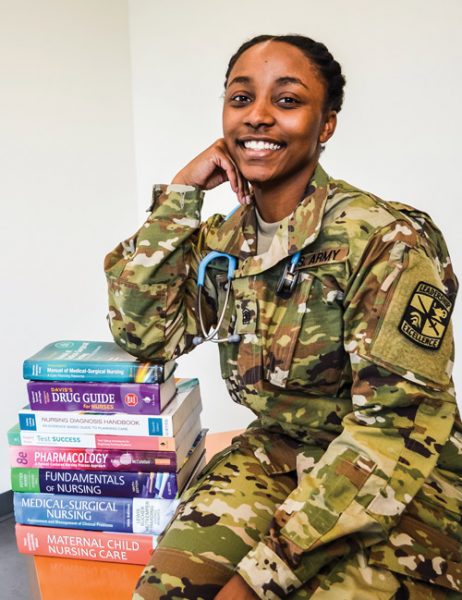Georgia Southern ROTC Nursing Program Leads the Nation

It takes a special kind of person to become an Army nurse.
The demands upon the ROTC nursing student are relentless. In addition to nursing classes, medical training, clinicals and exams, they’re also required to learn Army doctrine, perform rigorous physical training and field exercises, and participate in leadership training and competitions during coveted summer breaks. For many who enter the program, they decide it’s too much.
“There’s an attrition,” said ROTC Scholarship and Enrollment Officer George Fredrick. “If I bring in 10 freshman nurse cadets … four years later, I probably have four who stick with nursing. The other cadets change majors. Everybody can’t do that. They learn early in the pre-nursing phase. We’re aware of those numbers, and we’re aware of what it takes.”
Despite the challenges for students and recruiters, however, Georgia Southern University—for the fifth year in a row—leads the nation in producing Army nurses. It’s a formidable accomplishment Fredrick says is built on an essential partnership between ROTC and the School of Nursing.
“We have a longstanding great relationship with nursing,” he said. “We cannot do this without their partnership. We cannot sustain this without them.”
Now in its 20th year, the ROTC nursing program initially struggled to find the right students and help them get through to graduation and pinning. As the program continued to develop, the Army, too, was struggling to produce enough nurses each year. And after several U.S. military conflicts in the early 2000s, the call went out to all ROTC nursing programs around the country to produce more Army nurses … and quickly.
In response, ROTC and the School of Nursing came together and developed a model to help students succeed. In this new model, on the nursing side, each class reserves five spots for ROTC nurses who meet the minimum requirements of the nursing program; and on the ROTC side, the program is rearranged to allow nursing students to get leadership training earlier in order to avoid the difficult overlap with clinicals.
It’s a successful partnership that has brought the University national acclaim.
“It’s a good opportunity for us,” said Melissa Garno, Ed.D., RN, professor and director of the Bachelor of Science in Nursing (BSN) program. “We’ve got a quality program, and we’re helping educate the people that defend and serve our country.”
The program has been good for students, too.
Destinee Wesley, a senior ROTC nursing student from Hephzibah, Georgia, says there have been many times she thought she couldn’t do it, but always found the encouragement to keep going.
“I didn’t think I was going to make it through my first semester of nursing school,” she said. “Everybody in ROTC—when I would come in the building with a gray cloud over my head and bags under my eyes—they would say, ‘You’re going to be fine,’ and they would be smiling.
“I had a good support system.”
Wesley says she has now grown accustomed to waking up at 5 a.m., doing physical training, studying and then doing 12-hour clinical shifts at Memorial Medical Center in Savannah. It’s a schedule not everyone wants to adopt.
“The other nursing students always say, ‘I don’t know how you do it,’” she said.
Fredrick says he knows ROTC nursing students are special. In order for him to find a new batch of these elite students, he has to find them in high school or early in their freshman year of college. He says the future looks especially bright now that our nursing program has expanded to the Armstrong Campus in Savannah, and he hopes to form strong partnerships there as well.
ROTC nurses are a rare breed, and it takes hard work to fill those seats—even harder to maintain the top spot in the nation with larger universities nipping at his heels.
“Excellence can only be sustained if everybody agrees to work hard,” said Fredrick. “Other schools would love to have this title. I’m selfish. This is Georgia Southern!”
— Doy Cave
